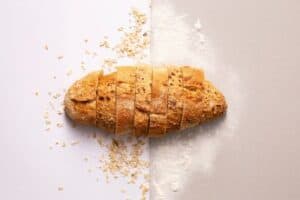
31 Oct 5 Foods to Avoid to Help Prevent Cavities
What 5 Foods Should You Avoid to Prevent Cavities?
If you’re looking to keep your teeth healthy and cavity-free, it’s important to watch what you eat. Certain foods are known to cause cavities, while others can help protect your teeth. In this blog post, we will discuss five of the worst foods for your teeth and how to avoid them.
- Sweets & Candy
- Starchy Foods
- Acidic Foods & Drinks
- Alcohol
- Tobacco
Why Should You Avoid Sweets and Candy?
The sugars in candy and sweets are a favorite food source for the bacteria that cause cavities. When these bacteria feed on sugar, they produce acids that can damage tooth enamel. In addition, sticky candies can stay on your teeth long after you eat them, increasing the amount of time that your teeth are exposed to cavity-causing bacteria.

Why Should You Avoid Starchy Foods?
Starchy foods, such as breads and crackers, can also contribute to cavities. These foods break down into simple sugars when they are chewed, which can then feed cavity-causing bacteria. In addition, starchy foods often get stuck in the nooks and crannies of your teeth, where they can provide a food source for bacteria.
Why Should You Avoid Acidic Foods and Drinks?
Acidic foods and drinks can also damage tooth enamel. When the acid in these foods or drinks comes into contact with your teeth, it can strip away the protective enamel layer. This exposes the inner layers of your teeth to bacteria and can lead to cavities.
Why Should You Avoid Alcohol?
Drinking alcohol can also increase your risk for cavities. Alcohol is a depressant, which means it slows down the production of saliva. Saliva is important because it helps cleanse the mouth of bacteria and food particles. Without enough saliva, bacteria can build up in the mouth and cause cavities.
Why Should You Avoid Tobacco?
Tobacco is another major risk factor for cavities. Tobacco contains nicotine and other chemicals that can damage tooth enamel and make it more difficult for saliva to do its job. In addition, tobacco use has been linked to an increased risk of gum disease, which can also lead to cavities.
How Can You Prevent Cavities?
Fortunately, there are a few simple things you can do to help prevent cavities. First, be sure to brush your teeth at least twice a day with a fluoride toothpaste. Fluoride helps strengthen tooth enamel and makes it more resistant to cavities. In addition, be sure to floss your teeth every day to remove food particles and plaque from between your teeth. Finally, limit your consumption of sugary and starchy foods, and acidic drinks. By following these simple tips, you can help keep your teeth healthy and cavity-free!

What Are Good Dental Hygiene Tips to Prevent Cavities When You Do Have These Food & Drink?
- See your dentist at least once a year for a professional cleaning and checkup.
- Brush your teeth at least twice a day with a fluoride toothpaste.
- Floss your teeth every day.
- Limit your consumption of sugary and starchy foods, and acidic drinks.
- Chewing sugarless gum can also help prevent cavities by stimulating saliva flow.
- Use alcohol-free mouthwashes to help reduce the risk of cavities.
- If you smoke, quit tobacco use to reduce your risk of cavities and other oral health problems.
What Are the Best Hygiene Steps When Brushing Your Teeth?
Be sure to brush all surfaces of your teeth, using a pea-sized amount of toothpaste.
Hold your toothbrush against your teeth at a 45-degree angle and use gentle circular motions.
Be sure to brush for at least two minutes. Then spit the toothpaste out after brushing, and rinse your mouth with water.
It’s best to brush your teeth after meals and at bedtime. If you can’t brush after eating, chewing sugarless gum or drinking water can help remove food particles from your teeth and reduce the risk of cavities.
What Are the Best Hygiene Steps When Flossing Your Teeth?
Wind 18 inches of floss around your middle fingers, leaving about an inch of floss to work with. Gently guide the floss between your teeth, using a back-and-forth motion. Be sure to curve the floss around the base of each tooth and under the gumline. Use a clean section of floss for each tooth. When you’re finished, throw away the used floss and rinse your mouth with water.
Flossing once a day is sufficient for most people. However, if you have braces or other dental devices, you may need to floss more frequently. Your dentist can give you specific instructions on how to floss with braces or other dental devices.
What Foods Give You Strong Healthy Teeth?
There are a few specific foods that can help keep your teeth healthy and strong. These include:
- Cheese: Cheese contains calcium, which is essential for strong teeth. In addition, cheese can help increase saliva flow, which can help reduce the risk of cavities.
- Almonds: Almonds are a good source of vitamin E, which can help protect your gums from inflammation.
- Yogurt: Yogurt contains probiotics, which are good for oral health. In addition, yogurt is a good source of calcium and protein, both of which are important for strong teeth.
- Green Tea: Green tea contains catechins, which are antioxidants that can help reduce the risk of cavities.
- Water: Water is essential for oral health. It helps rinse away food particles and plaque, and it also helps keep your mouth hydrated.
By including these foods in your diet, you can help keep your teeth healthy and strong!

What Are Some Good Dental Hygiene Habits to Include?
- Brushing your teeth at least twice a day with a fluoride toothpaste.
- Flossing your teeth every day.
- Limit your consumption of sugary and starchy foods, and acidic drinks.
- Chewing sugarless gum can also help prevent cavities by stimulating saliva flow.
- Use alcohol-free mouthwashes to help reduce the risk of cavities.
- If you smoke, quit tobacco use to reduce your risk of cavities and other oral health problems.
- See your dentist at least once a year for a professional cleaning and checkup.
Can You Reverse a Cavity?
If you have a cavity, it’s important to see your dentist as soon as possible. If the cavity is caught early enough, your dentist may be able to treat it with a filling. However, if the cavity is not treated, it will continue to grow and can eventually lead to tooth decay. Once tooth decay has begun, it can only be reversed with a root canal or other dental procedure.
When Is It Too Late to Reverse a Cavity?
Once tooth decay has begun, it is not possible to reverse the process. However, it is possible to halt the progression of tooth decay and prevent further damage by getting dental treatment. If you have a cavity, be sure to see your dentist as soon as possible for treatment.
Can Supplements Help with Cavities?
There is no evidence that supplements can help prevent or treat cavities. However, there are some vitamins and minerals that are important for oral health, including calcium and vitamin D. If you are concerned about your oral health, talk to your dentist about ways to improve your dental hygiene habits.
What Vitamins & Minerals Are Important for Oral Health?
There are a few vitamins and minerals that are important for oral health, including calcium, vitamin D, and phosphorus. Calcium is essential for strong teeth, and vitamin D helps the body absorb calcium. Phosphorus helps harden tooth enamel. These nutrients are found in dairy products, leafy green vegetables, and some meats and fish.
In Conclusion
Cavities are a common problem, but they can be prevented with good dental hygiene habits. Be sure to brush your teeth twice a day, floss every day, and limit your consumption of these 5 food and drink types that are known to cause more cavities. In addition, see your dentist regularly for professional cleanings and checkups. If you have a cavity, it’s important to get treatment as soon as possible to prevent further damage.


Sorry, the comment form is closed at this time.